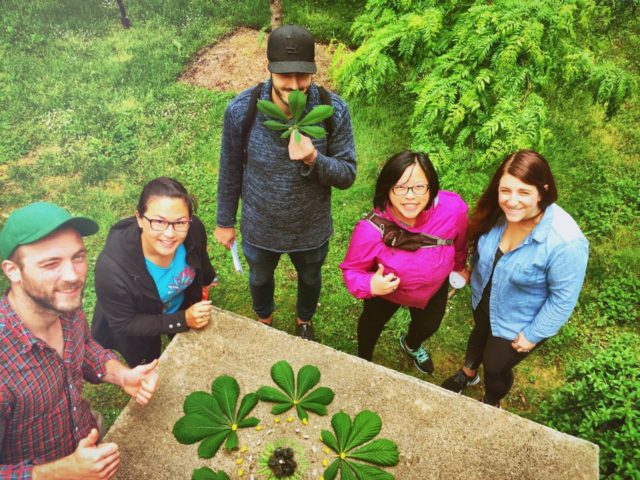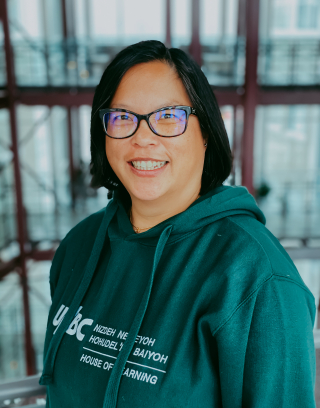
My name is Dr. Christine Ho Younghusband. I am a second generation Chinese Canadian woman. My mom and dad immigrated to Canada when my sister was 2-years old. My twin brother and I were born and raised in Prince Rupert, BC. I went to UBC for my B.Sc. and B.Ed., and I taught math and science in BC public schools for 16-years. During that time, I completed my M.Ed. in Curriculum and Instruction at SFU then left teaching to complete my EdD in Educational Leadership at SFU. My dissertation titled “The Professional Learning Experiences of Non-Mathematics Subject Specialist Teachers: A Descriptive Study” was successfully defended in 2017. See details below.
During my doctoral studies, I served as an elected school trustee for 7-years and director for the BC School Trustees Association Board of Directors for 3-years. In 2018, I joined the University of Northern British Columbia (UNBC) as an Assistant Professor and I teach in the Teacher Education Program (TEP) and Graduate Studies. My love for education has rekindled and enjoy developing my practice with the land based learning, in situ learning, and reflective practice using e-Portfolios. I started this portfolio in 2019 when I was teaching EDUC 431 (EdTech). I wanted to model what it would be like to create a portfolio that one would create a digital narrative that is formative and summative in nature.
I return back to developing this portfolio in 2022/2023 as the course instructor in EDUC 405 (Reflective Practice and Inquiry Through Portfolios) as part of the B.Ed. Program Redesign which is woven throughout the Teacher Education Program. I enjoy teaching and learning with students in my classes. Developing this portfolio is helping me to reflect on my practice, my pedagogy, and my values and beliefs. It has been wonderful to see how much of what I do (when I’m in the flow) in teacher education or graduate studies, feels much the same when I was teaching math. I will savour these moments while challenging myself to try new things and learn.
The learner stance has served me well, in addition to being vulnerable and curious. My Pedagogical Journey continues here on the unceded ancestral territory of the Lheidli T’enneh. Life has taken many twists and turns to be where I am today, and I’m grateful to have this opportunity to teach, learn, and lead at the university.
My research interests include: subject matter acquisition, mathematics education, policy and practice, culture and mathematics, professional learning experiences, formative assessment, action research, BC education, and teacher education.
UNBC Profile: https://www2.unbc.ca/people/ho-younghusband-dr-christine

Doctor of Education – Defended: August 2017
Simon Fraser University in Educational Leadership
“The Professional Learning Experiences of Non-Mathematics Subject Specialist Teachers – A Descriptive Study” is focused on what professional learning activities Non-Mathematics Subject Specialist Teachers (NMSSTs) participated in to gain subject matter content knowledge in mathematics to teach mathematics in BC schools.
Abstract:
Certified teachers in British Columbia (BC) schools can be assigned to teach secondary mathematics without having a major, minor, or formal background in mathematics. This is known as out-of-field teaching. These non-mathematics subject specialist teachers (NMSSTs) must learn or relearn the subject matter of mathematics to teach secondary mathematics. This study investigates what professional learning activities NMSSTs participate in to gain subject matter content knowledge in mathematics, which activities these teachers believed best facilitated the acquisition of subject matter, and which they believed helped them to teach secondary mathematics better. This was a descriptive study using survey methods. Sixteen professional learning activities were considered. The survey questionnaire was distributed and completed online. Sixty-two NMSSTs completed the survey in full. Most learned the subject matter autodidactically from teaching secondary mathematics, referring to textbooks, or going online. However, formal learning activities such as completing a graduate degree in mathematics or a mathematics-related field best facilitated the acquisition of the subject matter and helped in teaching mathematics better. Other findings include the following: learning from an expert in the field was highly valued; professional learning days were not highly valued but frequently participated-in; the perceived level of subject matter content knowledge of those who completed a graduate degree and those who did not were the same; the NMSST characteristic of perceived level of subject matter content knowledge did not influence participants in this study to self-identify as mathematics subject specialists. Recommendations for practitioners included not learning the subject matter in isolation and to find a mentor. Recommendations for school leaders were to redesign professional development days and to consider purposeful teaching assignments. Recommendations for future research were to develop a self-assessment tool and to implement a study on subject matter acquisition of NMSSTs in a master of mathematics education program. Recommendations for policy-makers included providing alternative professional development opportunities for teachers and setting standards for NMSSTs to help them self-assess their subject matter content knowledge in mathematics.
Keywords: content knowledge; out-of-field teaching; professional learning; experiential learning; self-directed learning; subject matter
SFU Library Link: http://summit.sfu.ca/item/17485




